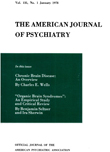Familial (genetic) subtypes of pure depressive disease
Abstract
The author reviewed data from five studies and found that depressed patients with a history of depression in a parent or child have more sibships containing depression than depressed patients without this family history. Thus, there is a clustering of depressions in certain families. Sporadic pure depressive disease (PDD), where no depressive illness exists in a first-degree family member of a depressed proband, is associated with a later age of onset than familial PDD, where depressive illness does exist in a first-degree relationship. The possibility exists that familial PDD and sporadic PDD are autonomous illnesses. The presence of a family history of depression may be predictive to some extent of a good response to adequate tricyclic medication or ECT.
Access content
To read the fulltext, please use one of the options below to sign in or purchase access.- Personal login
- Institutional Login
- Sign in via OpenAthens
- Register for access
-
Please login/register if you wish to pair your device and check access availability.
Not a subscriber?
PsychiatryOnline subscription options offer access to the DSM-5 library, books, journals, CME, and patient resources. This all-in-one virtual library provides psychiatrists and mental health professionals with key resources for diagnosis, treatment, research, and professional development.
Need more help? PsychiatryOnline Customer Service may be reached by emailing [email protected] or by calling 800-368-5777 (in the U.S.) or 703-907-7322 (outside the U.S.).



